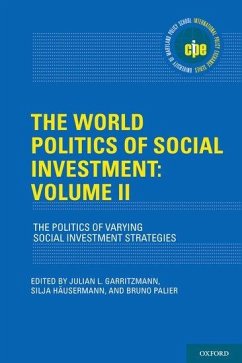The World Politics of Social Investment: Volume II
The Politics of Varying Social Investment Strategies
Herausgeber: Garritzmann, Julian L; Palier, Bruno; Häusermann, Silja
The World Politics of Social Investment: Volume II
The Politics of Varying Social Investment Strategies
Herausgeber: Garritzmann, Julian L; Palier, Bruno; Häusermann, Silja
- Gebundenes Buch
- Merkliste
- Auf die Merkliste
- Bewerten Bewerten
- Teilen
- Produkt teilen
- Produkterinnerung
- Produkterinnerung
The World Politics of Social Investment: Political Dynamics of Reform traces the development of social investment reforms across the regions of Nordic, Continental, and Southern Europe, as well as Central and Eastern Europe, North and Latin America, and North East Asia. The chapters in this volume study the impact of different structural drivers for social investment (e.g., demographic, poverty, demand for skill, or lack of an available workforce), the salience of social investment in the public debates, and the different political coalitions that led to or prevented the adoption of social investment strategies.…mehr
Andere Kunden interessierten sich auch für
![Impact of Natural Disasters on Systemic Political and Social Inequities in the U.S. Impact of Natural Disasters on Systemic Political and Social Inequities in the U.S.]() Impact of Natural Disasters on Systemic Political and Social Inequities in the U.S.104,99 €
Impact of Natural Disasters on Systemic Political and Social Inequities in the U.S.104,99 €![The Politics of Compassion The Politics of Compassion]() Bin XuThe Politics of Compassion108,99 €
Bin XuThe Politics of Compassion108,99 €![Beyond Self-Interest Beyond Self-Interest]() Krzysztof PelcBeyond Self-Interest32,99 €
Krzysztof PelcBeyond Self-Interest32,99 €![Be Very Afraid Be Very Afraid]() Robert WuthnowBe Very Afraid76,99 €
Robert WuthnowBe Very Afraid76,99 €![Catastrophe and Social Change Catastrophe and Social Change]() Samuel Henry PrinceCatastrophe and Social Change29,99 €
Samuel Henry PrinceCatastrophe and Social Change29,99 €![Litigating the Pandemic Litigating the Pandemic]() Susan M SterettLitigating the Pandemic37,99 €
Susan M SterettLitigating the Pandemic37,99 €![The Search for Apocalypse The Search for Apocalypse]() Michael R HutchinsonThe Search for Apocalypse21,99 €
Michael R HutchinsonThe Search for Apocalypse21,99 €-
-
-
The World Politics of Social Investment: Political Dynamics of Reform traces the development of social investment reforms across the regions of Nordic, Continental, and Southern Europe, as well as Central and Eastern Europe, North and Latin America, and North East Asia. The chapters in this volume study the impact of different structural drivers for social investment (e.g., demographic, poverty, demand for skill, or lack of an available workforce), the salience of social investment in the public debates, and the different political coalitions that led to or prevented the adoption of social investment strategies.
Produktdetails
- Produktdetails
- Verlag: Oxford University Press
- Seitenzahl: 520
- Erscheinungstermin: 20. Mai 2022
- Englisch
- Abmessung: 238mm x 159mm x 34mm
- Gewicht: 864g
- ISBN-13: 9780197601457
- ISBN-10: 0197601456
- Artikelnr.: 63939046
- Herstellerkennzeichnung
- Libri GmbH
- Europaallee 1
- 36244 Bad Hersfeld
- gpsr@libri.de
- Verlag: Oxford University Press
- Seitenzahl: 520
- Erscheinungstermin: 20. Mai 2022
- Englisch
- Abmessung: 238mm x 159mm x 34mm
- Gewicht: 864g
- ISBN-13: 9780197601457
- ISBN-10: 0197601456
- Artikelnr.: 63939046
- Herstellerkennzeichnung
- Libri GmbH
- Europaallee 1
- 36244 Bad Hersfeld
- gpsr@libri.de
Julian L. Garritzmann is Professor of Political Science at the Goethe University Frankfurt. As a comparative political scientist, his research lies at the intersection of comparative political economy, political sociology, and comparative political institutions. He specializes in welfare state research, education and social investment policy, global social policy, party politics, and public opinion. Julian Garritzmann holds a PhD from the University of Konstanz, Germany. Before joining Frankfurt, he was Senior Researcher at the University of Zurich, Switzerland, and Max Weber Fellow at the European University Institute, Florence, Italy, and held Visiting Fellow positions at Harvard, Duke, and Rutgers. His publications include The Political Economy of Higher Education Finance (awarded the German Political Science Association's Dissertation Prize), and A Loud, but Noisy Signal? Public Opinion, Parties, and Interest Groups in the Politics of Education Reform in Western Europe (Cambridge University Press) as well as several articles in journals such as the European Journal of Political Research, European Sociological Review, Journal of European Social Policy, Journal of European Public Policy, Journal of Legislative Studies and West European Politics. Homepage: https://sites.google.com/site/juliangarritzmann/ Silja Häusermann is Professor of Political Science at the University of Zurich. Her current research specializes in the fields of comparative welfare state research and comparative electoral research. She has been a Fellow at the Wissenschaftskolleg zu Berlin in 2018/2019 and directs the ERC-funded grant "welfarepriorities" (www.welfarepriorities.eu), which studies the transformation of distributive conflict in relation with the transformation of European mass politics. At the University of Zurich, she is the co-director of the University Research Priority Programme "Equality of Opportunities". She is the author of The Politics of Welfare State Reform in Continental Europe: Modernization in Hard Times (CUP, 2010), and a co-author of The Age of Dualization: The Changing Face of Inequality in Deindustrializing Countries (OUP, 2012), The Politics of Advanced Capitalism (CUP, 2015) and Contention in Times of Crisis: Recession and Political Protest in Thirty European Countries (CUP, 2020). Homepage: www.siljahaeusermann.org Bruno Palier is CNRS Research Director at Sciences Po, Centre d'études européennes et de politique comparée. Trained in social science, he has a PhD in political science, and is a former student of Ecole Normale Superieure. He was director of LIEPP (Laboratory for interdisciplinary Evaluation of Public Policies). He works on the comparative political economy of welfare state reforms. He was the scientific coordinator of a European Network of excellence RECWOWE (Reconciling Work and Welfare, involving 30 European research institutions or Universities, 190 researchers from 19 European countries). He was Guest Professor at the University of Stockholm, Visiting Scholar at Northwestern University, at Center for European Studies from Harvard University in 2001 and Jean Monnet Fellow in the European University Institute in Florence in 1998-1999.
* Introduction
* 1. Structural Constraints, Institutional Legacies, and the Politics
of Social Investment across World Regions
* Silja Häusermann, Julian L. Garritzmann, Bruno Palier
* Part I: Western Europe and North America
* 2. Legacies of Universalism: Origins and Persistence of the Broad
Political Support for Inclusive Social Investment in Scandinavia
* Alexander Horn, Kees van Kersbergen
* 3. Loud, Noisy, or Quiet Politics? The Role of Public Opinion,
Parties, and Interest Groups in Social Investment Reforms in Western
Europe
* Marius R. Busemeyer, Julian L. Garritzmann
* 4. The Partisan Politics of Family and Labor Market Policy Reforms in
Southern Europe
* Reto Bürgisser
* 5. Reforming without Investing: Explaining Non-social Investment
Strategies in Italy
* Stefano Ronchi, Patrik Vesan
* 6. The Politics of Early Years and Family Policy Investments in North
America
* Susan Prentice, Linda White
* Part II: Central and Eastern Europe
* 7. "Nation (Re)building through Social Investment? The Baltic Reform
Trajectories"
* Anu Toots, Triin Lauri
* 8. Explaining the Weakness of Social Investment Policies in the
Visegrád Countries: The Cases of Childcare and Active Labor Market
Policies
* Dorota Szelewa, Michal Polakowski
* 9. Explaining the Contrasting Welfare Trajectories of the Baltic and
Visegrád Countries: A Growth-Strategy Perspective
* Sonja Avlija
* Part III: North East Asia
* 10. The Politicization of Social Investment in the Media and
Legislature in North East Asia
* Jaemin Shim
* 11. An Increasing but Diverse Support for Social investment: Public
Opinion on Social Investment in the North East Asian Welfare Systems
* Ijin Hong, Chung-Yang Yeh, Jieun Lee, Jen-Der Lue
* 12. The Quiet Diffusion of Social Investment in Japan: Toward
Stratification
* Mari Miura, Eriko Hamada
* 13. Politics of Social Investment in Post-industrial South Korea
* Sophia Seung-yoon Lee, Yeon-Myung Kim
* Part IV: Latin America
* 14. The Politicization of Social Investment in Latin America
* J. Salvador Peralta
* 15. Social Policy for Institutional Change: Bolivia, Brazil, and Peru
* Jane Jenson, Nora Nagels
* 16. The Politics of Conditionality in Latin America's Cash Transfer
Reforms
* Cecilia Rossel, Florencia Antía, Pilar Manzi
* 17. How Democracies Transform their Welfare States: The Reform
Trajectories and Political Coalitions of Inclusive, Stratified, and
Targeted Social Investment Strategies Around the World
* Bruno Palier, Julian L. Garritzmann, Silja Häusermann, Francesco
Fioritto
* 1. Structural Constraints, Institutional Legacies, and the Politics
of Social Investment across World Regions
* Silja Häusermann, Julian L. Garritzmann, Bruno Palier
* Part I: Western Europe and North America
* 2. Legacies of Universalism: Origins and Persistence of the Broad
Political Support for Inclusive Social Investment in Scandinavia
* Alexander Horn, Kees van Kersbergen
* 3. Loud, Noisy, or Quiet Politics? The Role of Public Opinion,
Parties, and Interest Groups in Social Investment Reforms in Western
Europe
* Marius R. Busemeyer, Julian L. Garritzmann
* 4. The Partisan Politics of Family and Labor Market Policy Reforms in
Southern Europe
* Reto Bürgisser
* 5. Reforming without Investing: Explaining Non-social Investment
Strategies in Italy
* Stefano Ronchi, Patrik Vesan
* 6. The Politics of Early Years and Family Policy Investments in North
America
* Susan Prentice, Linda White
* Part II: Central and Eastern Europe
* 7. "Nation (Re)building through Social Investment? The Baltic Reform
Trajectories"
* Anu Toots, Triin Lauri
* 8. Explaining the Weakness of Social Investment Policies in the
Visegrád Countries: The Cases of Childcare and Active Labor Market
Policies
* Dorota Szelewa, Michal Polakowski
* 9. Explaining the Contrasting Welfare Trajectories of the Baltic and
Visegrád Countries: A Growth-Strategy Perspective
* Sonja Avlija
* Part III: North East Asia
* 10. The Politicization of Social Investment in the Media and
Legislature in North East Asia
* Jaemin Shim
* 11. An Increasing but Diverse Support for Social investment: Public
Opinion on Social Investment in the North East Asian Welfare Systems
* Ijin Hong, Chung-Yang Yeh, Jieun Lee, Jen-Der Lue
* 12. The Quiet Diffusion of Social Investment in Japan: Toward
Stratification
* Mari Miura, Eriko Hamada
* 13. Politics of Social Investment in Post-industrial South Korea
* Sophia Seung-yoon Lee, Yeon-Myung Kim
* Part IV: Latin America
* 14. The Politicization of Social Investment in Latin America
* J. Salvador Peralta
* 15. Social Policy for Institutional Change: Bolivia, Brazil, and Peru
* Jane Jenson, Nora Nagels
* 16. The Politics of Conditionality in Latin America's Cash Transfer
Reforms
* Cecilia Rossel, Florencia Antía, Pilar Manzi
* 17. How Democracies Transform their Welfare States: The Reform
Trajectories and Political Coalitions of Inclusive, Stratified, and
Targeted Social Investment Strategies Around the World
* Bruno Palier, Julian L. Garritzmann, Silja Häusermann, Francesco
Fioritto
* Introduction
* 1. Structural Constraints, Institutional Legacies, and the Politics
of Social Investment across World Regions
* Silja Häusermann, Julian L. Garritzmann, Bruno Palier
* Part I: Western Europe and North America
* 2. Legacies of Universalism: Origins and Persistence of the Broad
Political Support for Inclusive Social Investment in Scandinavia
* Alexander Horn, Kees van Kersbergen
* 3. Loud, Noisy, or Quiet Politics? The Role of Public Opinion,
Parties, and Interest Groups in Social Investment Reforms in Western
Europe
* Marius R. Busemeyer, Julian L. Garritzmann
* 4. The Partisan Politics of Family and Labor Market Policy Reforms in
Southern Europe
* Reto Bürgisser
* 5. Reforming without Investing: Explaining Non-social Investment
Strategies in Italy
* Stefano Ronchi, Patrik Vesan
* 6. The Politics of Early Years and Family Policy Investments in North
America
* Susan Prentice, Linda White
* Part II: Central and Eastern Europe
* 7. "Nation (Re)building through Social Investment? The Baltic Reform
Trajectories"
* Anu Toots, Triin Lauri
* 8. Explaining the Weakness of Social Investment Policies in the
Visegrád Countries: The Cases of Childcare and Active Labor Market
Policies
* Dorota Szelewa, Michal Polakowski
* 9. Explaining the Contrasting Welfare Trajectories of the Baltic and
Visegrád Countries: A Growth-Strategy Perspective
* Sonja Avlija
* Part III: North East Asia
* 10. The Politicization of Social Investment in the Media and
Legislature in North East Asia
* Jaemin Shim
* 11. An Increasing but Diverse Support for Social investment: Public
Opinion on Social Investment in the North East Asian Welfare Systems
* Ijin Hong, Chung-Yang Yeh, Jieun Lee, Jen-Der Lue
* 12. The Quiet Diffusion of Social Investment in Japan: Toward
Stratification
* Mari Miura, Eriko Hamada
* 13. Politics of Social Investment in Post-industrial South Korea
* Sophia Seung-yoon Lee, Yeon-Myung Kim
* Part IV: Latin America
* 14. The Politicization of Social Investment in Latin America
* J. Salvador Peralta
* 15. Social Policy for Institutional Change: Bolivia, Brazil, and Peru
* Jane Jenson, Nora Nagels
* 16. The Politics of Conditionality in Latin America's Cash Transfer
Reforms
* Cecilia Rossel, Florencia Antía, Pilar Manzi
* 17. How Democracies Transform their Welfare States: The Reform
Trajectories and Political Coalitions of Inclusive, Stratified, and
Targeted Social Investment Strategies Around the World
* Bruno Palier, Julian L. Garritzmann, Silja Häusermann, Francesco
Fioritto
* 1. Structural Constraints, Institutional Legacies, and the Politics
of Social Investment across World Regions
* Silja Häusermann, Julian L. Garritzmann, Bruno Palier
* Part I: Western Europe and North America
* 2. Legacies of Universalism: Origins and Persistence of the Broad
Political Support for Inclusive Social Investment in Scandinavia
* Alexander Horn, Kees van Kersbergen
* 3. Loud, Noisy, or Quiet Politics? The Role of Public Opinion,
Parties, and Interest Groups in Social Investment Reforms in Western
Europe
* Marius R. Busemeyer, Julian L. Garritzmann
* 4. The Partisan Politics of Family and Labor Market Policy Reforms in
Southern Europe
* Reto Bürgisser
* 5. Reforming without Investing: Explaining Non-social Investment
Strategies in Italy
* Stefano Ronchi, Patrik Vesan
* 6. The Politics of Early Years and Family Policy Investments in North
America
* Susan Prentice, Linda White
* Part II: Central and Eastern Europe
* 7. "Nation (Re)building through Social Investment? The Baltic Reform
Trajectories"
* Anu Toots, Triin Lauri
* 8. Explaining the Weakness of Social Investment Policies in the
Visegrád Countries: The Cases of Childcare and Active Labor Market
Policies
* Dorota Szelewa, Michal Polakowski
* 9. Explaining the Contrasting Welfare Trajectories of the Baltic and
Visegrád Countries: A Growth-Strategy Perspective
* Sonja Avlija
* Part III: North East Asia
* 10. The Politicization of Social Investment in the Media and
Legislature in North East Asia
* Jaemin Shim
* 11. An Increasing but Diverse Support for Social investment: Public
Opinion on Social Investment in the North East Asian Welfare Systems
* Ijin Hong, Chung-Yang Yeh, Jieun Lee, Jen-Der Lue
* 12. The Quiet Diffusion of Social Investment in Japan: Toward
Stratification
* Mari Miura, Eriko Hamada
* 13. Politics of Social Investment in Post-industrial South Korea
* Sophia Seung-yoon Lee, Yeon-Myung Kim
* Part IV: Latin America
* 14. The Politicization of Social Investment in Latin America
* J. Salvador Peralta
* 15. Social Policy for Institutional Change: Bolivia, Brazil, and Peru
* Jane Jenson, Nora Nagels
* 16. The Politics of Conditionality in Latin America's Cash Transfer
Reforms
* Cecilia Rossel, Florencia Antía, Pilar Manzi
* 17. How Democracies Transform their Welfare States: The Reform
Trajectories and Political Coalitions of Inclusive, Stratified, and
Targeted Social Investment Strategies Around the World
* Bruno Palier, Julian L. Garritzmann, Silja Häusermann, Francesco
Fioritto








